Fleurs du Mal Magazine


Or see the index
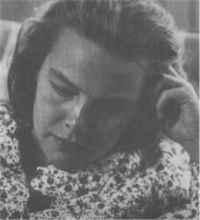
Survivors—Found
We thought that they were gone—
we rarely saw them on our screens—
those everyday Americans
with workaday routines,
and the heroes standing ready—
not glamorous enough—
on days without a tragedy,
we clicked—and turned them off.
We only saw the cynics—
the dropouts, show-offs, snobs—
the right- and left- wing critics:
we saw that they were us.
But with the wounds of Tuesday
when the smoke began to clear,
we rubbed away our stony gaze—
and watched them reappear:
the waitress in the tower,
the broker reading mail,
a pair of window washers,
filling up a final pail,
the husband’s last “I love you”
from the last seat of a plane,
the tourist taking in a view
no one would see again,
the fireman, his eyes ablaze
as he climbed the swaying stairs—
he knew someone might still be saved.
We wondered who it was.
We glimpsed them through the rubble:
the ones who lost their lives,
the heroes’ double burials,
the ones now “left behind,”
the ones who rolled a sleeve up,
the ones in scrubs and masks,
the ones who lifted buckets
filled with stone and grief and ash:
some spoke a different language—
still no one missed a phrase;
the soot had softened every face
of every shade and age—
“the greatest generation” ?—
we wondered where they’d gone—
they hadn’t left directions
how to find our nation-home:
for thirty years we saw few signs,
but now in swirls of dust,
they were alive—they had survived—
we saw that they were us.
Joan Murray
(1917-1942)
Survivors—Found
(poem)
• fleursdumal.nl magazine
More in: Archive M-N, Archive M-N, Joan Murray
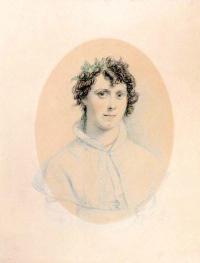
Love
Oh Love! how fondly, tenderly enshrined
In human hearts, how with our being twined!
Immortal principle, in mercy given,
The brightest mirror of the joys of heaven.
Child of Eternity’s unclouded clime,
Too fair for earth, too infinite for time:
A seraph watching o’er Death’s sullen shroud,
A sunbeam streaming through a stormy cloud;
An angel hovering o’er the paths of life,
But sought in vain amidst its cares and strife;
Claimed by the many–known but to the few
Who keep thy great Original in view;
Who, void of passion’s dross, behold in thee
A glorious attribute of Deity!
Susanna Moodie:
Love (Poem)
(1803 – 1885)
• fleursdumal.nl magazine
More in: Archive M-N, Archive M-N, CLASSIC POETRY
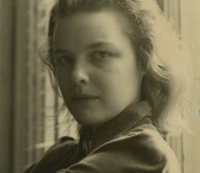
Vermont and the Hills and the Valleys
1
Tremendous are the ways of the simple people,
The hills speak with their mouths,
The sky laughs out the rims of their eyes,
The earth walks with the feet of the people
And the wind and the dead are their souls awake
And the sleep, that is theirs comes when the eye-lid
Slips down to meet the soiled slant of their cheeks.
2
Great are the mountain slopes curving along the line
Flanked by the river or the smooth-glint track of train:
A speed of smoke, a sprung-coil loosely heaped beyond the span of steel.
Look to right — look to the left and the fields
That fit in languid patterns between trees,
Umber cornstalks, hay in warm-split stacks!
3
Tight is the hair of women who call cows to the milking,
Wrists and fingers playing out the movement of the udder-press.
White is the angle and the piss and splash of milk.
Let it be remembered, O, let it be remembered
That there are the women and the simple people!
4
The oxen plow and wagon the hay in its high dung-gold,
Making long horns shape and hold the moon,
The red of their sides squat.
The green of the trees spring in wide green waves to the wind,
To the fields and the wide-palmed spread of space.
5
The men are before the night:
With the cracks of their cheeks filled with dust,
And the hands heavy like listless takes swung down,
And the dirt and sweat on their lips,
And the rise and fall of their chests.
6
The women go from the milking to the pot without compunction.
Steps of men and women from the field to the home,
From the plow to the reaping in the deep high swell of wheat.
There are the simple people
Whose hands rest still on a Sabbath,
And great are the fields and the mountains,
And great are the slopes and the valleys.
Joan Murray
(1917-1942)
Vermont and the Hills and the Valleys
(poem)
• fleursdumal.nl magazine
More in: Archive M-N, Archive M-N, Joan Murray

Chrysalis
1
It’s mid-September, and in the Magic Wing Butterfly Conservancy
in Deerfield, Massachusetts, the woman at the register
is ringing up the items of a small girl and her mother.
There are pencils and postcards and a paperweight–
all with butterflies–and, chilly but alive,
three monarch caterpillars–in small white boxes
with cellophane tops, and holes punched in their sides.
The girl keeps rearranging them like a shell game
while the cashier chats with her mother: “They have to
feed on milkweed–you can buy it in the nursery outside.”
“We’ve got a field behind our house,” the mother answers.
The cashier smiles to show she didn’t need the sale:
“And in no time, they’ll be on their way to Brazil or Argentina–
or wherever they go–” (“to Mexico,” says the girl,
though she’s ignored) “and you can watch them
do their thing till they’re ready to fly.”
2
I remember the monarchs my son and I brought in one summer
on bright pink flowers we’d picked along the swamp
on Yetter’s farm. We were “city folks,” eager for nature
and ignorant–we left our TV home–and left the flowers
in a jar on the dry sink in the trailer. We never noticed the caterpillars
till we puzzled out the mystery of the small black things
on the marble top–which turned out to be their droppings.
And soon, three pale green dollops hung from the carved-out leaves,
each studded with four gold beads–so gold they looked to be
mineral–not animal–a miracle that kept us amazed
as the walls grew clear and the transformed things broke through,
pumped fluid in their wings, dried off–and flew.
I gauge from that memory that it will be next month
before the girls are “ready.” I wonder how they’ll “fly”
when there’s been frost. “And they’ll come back next summer,”
the cashier says, “to the very same field–they always do.”
I’m sure that isn’t true. But why punch holes
in our little hopes when we have so few?
3
Next month, my mother will have a hole put in her skull
to drain the fluid that’s been weighing on her brain.
All summer, she’s lain in one hospital or another–
yet the old complainer’s never complained.
In Mather, the woman beside her spent a week in a coma,
wrapped like a white cocoon with an open mouth
(a nurse came now and then to dab the drool).
My mother claimed the woman’s husband was there too–
“doing what they do”–though it didn’t annoy her.
Now she’s in Stony Brook–on the eighteenth floor.
I realize I don’t know her anymore. When she beat against
the window to break through, they had to strap her down
–and yet how happy and how likeable she’s become.
When I visit, I spend my nights in her empty house–
in the bed she and my father used to share. Perhaps they’re
there. Perhaps we do come back year after year
to do what we’ve always done–if we can’t make
our way to kingdom come, or lose ourselves altogether.
Joan Murray
(1917-1942)
Chrysalis
(poem)
• fleursdumal.nl magazine
More in: Archive M-N, Archive M-N, Joan Murray
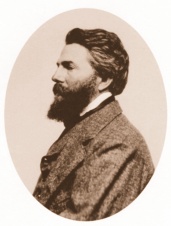
Formerly A Slave
The sufferance of her race is shown,
And retrospect of life,
Which now too late deliverance dawns upon;
Yet is she not at strife.
Her children’s children they shall know
The good withheld from her;
And so her reverie takes prophetic cheer–
In spirit she sees the stir.
Far down the depth of thousand years,
And marks the revel shine;
Her dusky face is lit with sober light,
Sibylline, yet benign.
Herman Melville
(1819 – 1891)
Formerly A Slave
• fleursdumal.nl magazine
More in: Archive M-N, Archive M-N, Herman Melville

Even the gulls of the cool Atlantic
Even the gulls of the cool Atlantic retip the silver foam,
The boats that warn me of the fog warn me of their motion
I have looked for my childhood among pebbles my home
Within the lean cupboards of motherhubbard and clipped Albion
A wind whose freshness blows over the Cape to me
Has made me laugh at the memory of a friend whose hair is blond
Still we laugh and run our hands over the sea
From the farthest tip of land to the end of the end.
I had so often run down to these shores to stare out
If I took an island for a lover and Atlantic for my sheet
There was no one to tell me that loving across distance would turn about
And make the here and now an elsewhere of defeat.
In my twenty first year to have the grubby hand of a slums
Be the small child at my knee knee the glistening chalk
That sails to meet the stationary boat the water sloping as it comes
And all the Devon coast of grey and abrupt rock
By gazing across water I have flicked many gulls from my eyes
Shuffled small shells and green crabs at my feet
The day is cool the sun bright the piper cries
Shrilly tampering the untouched sand with delicate conceit.
Up beyond the height and over the bank I have a friend
How are your winter days and summer actions
There could be little more than a tea cup hour to make us comprehend
A mature man’s simplicity or grave child’s sweet reaction.
Joan Murray
(1917-1942)
Even the gulls of the cool Atlantic
(poem)
• fleursdumal.nl magazine
More in: Archive M-N, Archive M-N, Joan Murray, Natural history

A Requiem
For Soldiers lost in Ocean Transports
When, after storms that woodlands rue,
To valleys comes atoning dawn,
The robins blithe their orchard-sports renew;
And meadow-larks, no more withdrawn
Caroling fly in the languid blue;
The while, from many a hid recess,
Alert to partake the blessedness,
The pouring mites their airy dance pursue.
So, after ocean’s ghastly gales,
When laughing light of hoyden morning
breaks,
Every finny hider wakes–
From vaults profound swims up with
glittering scales;
Through the delightsome sea he sails,
With shoals of shining tiny things
Frolic on every wave that flings
Against the prow its showery spray;
All creatures joying in the morn,
Save them forever from joyance torn,
Whose bark was lost where now the
dolphins play;
Save them that by the fabled shore,
Down the pale stream are washed away,
Far to the reef of bones are borne;
And never revisits them the light,
Nor sight of long-sought land and pilot more;
Nor heed they now the lone bird’s flight
Round the lone spar where mid-sea surges
pour.
Herman Melville
(1819 – 1891)
A Requiem
For Soldiers lost in Ocean Transports
•fleursdumal.nl magazine
More in: Archive M-N, Archive M-N, Herman Melville, WAR & PEACE

One Morganatic Leer
You think you complain
of the ugliness of people.
Meet your own bed.
Smell what you said.
Your words, unmitigated, dead,
Sink like a noon sun in the crass tomb
beneath the steeple.
Two feet above the sand,
look down
A tartan shore,
A clan, a clack, a whore,
A mobile open door,
To the dog against the tree,
the brittle mugging clown.
Claws like tumbled fingers here
Stand for hands,
Elastic bands,
Minds and trends.
Thighs sprout here enough to breed
the honor of your morganatic leer.
Joan Murray
(1917-1942)
One Morganatic Leer
from: Poems (1947)
• fleursdumal.nl magazine
More in: Archive M-N, Archive M-N, Joan Murray

Art
In placid hours well-pleased we dream
Of many a brave unbodied scheme.
But form to lend, pulsed life create,
What unlike things must meet and mate:
A flame to melt–a wind to freeze;
Sad patience–joyous energies;
Humility–yet pride and scorn;
Instinct and study; love and hate;
Audacity–reverence. These must mate,
And fuse with Jacob’s mystic heart,
To wrestle with the angel–Art.
Herman Melville
(1819 – 1891)
Art

• fleursdumal.nl magazine
More in: Archive M-N, Archive M-N, Herman Melville
These never-before-published poems by Johnny Cash make the perfect gifts for music lovers and fans alike.
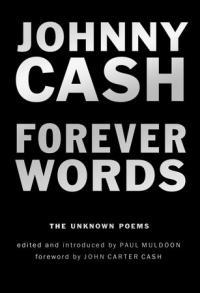 Edited and introduced by Pulitzer Prize-winning poet Paul Muldoon with a foreword by John Carter Cash, this poetry collection is illustrated with facsimile reproductions of Cash’s own handwritten pages. Now an album with music by Rosanne Cash, Brad Paisley, Willie Nelson, Kacey Musgraves, Elvis Costello, and more.
Edited and introduced by Pulitzer Prize-winning poet Paul Muldoon with a foreword by John Carter Cash, this poetry collection is illustrated with facsimile reproductions of Cash’s own handwritten pages. Now an album with music by Rosanne Cash, Brad Paisley, Willie Nelson, Kacey Musgraves, Elvis Costello, and more.
Since his first recordings in 1955, Johnny Cash has been an icon in the music world. In this collection of poems and song lyrics that have never been published before, we see the world through his eyes and view his reflection on his own interior reality, his frailties and his strengths alike. In his hallmark voice, he pens verses about love, pain, freedom, and mortality, and expresses insights on culture, his family, his fame, even Christmas. Forever Words confirms Johnny Cash as a brilliant and singular American literary figure. His music is a part of our collective history, and here the depth of his artistry and talent become even more evident.
JOHNNY CASH (1932–2003) was an American icon and country music superstar. He performed everywhere from Folsom State Prison to the White House. In 1980 he became the youngest living person to be chosen for the Country Music Hall of Fame; he was inducted into the Nashville Songwriters Hall of Fame in 1977, the Rock & Roll Hall of Fame in 1992, and the Gospel Music Hall of Fame in 2010. A recipient of the Kennedy Center Honors as well as the National Medal of Arts, he won nineteen Grammy Awards, four of them posthumously.
PAUL MULDOON is the author of twelve collections of verse, including Moy Sand and Gravel, for which he won the 2003 Pulitzer Prize for Poetry. He is the Howard G. B. Clark Professor at Princeton University, and between 1999 and 2004 he was Professor of Poetry at Oxford. Since 2007, Muldoon has been poetry editor of The New Yorker. He is a fellow of the Royal Society of Literature and of the American Academy of Arts and Letters.
Forever Words
The Unknown Poems
By Johnny Cash
Cat.: Poetry | Music
Paperback
$18.00
ISBN 9780399575150
144 Pages
Nov 12, 2019
Published by Plume
# new poetry
forever words
the unknown poems
by johnny cash
• fleursdumal.nl magazine
More in: # Music Archive, - Book News, Archive C-D, Archive C-D, Archive M-N, Art & Literature News, AUDIO, CINEMA, RADIO & TV

Night
I come, like Oblivion, to sweep away
The scattered beams from the car of day:
The gems which the evening has lavishly strown
Light up the lamps round my ebon throne.
Slowly I float through the realms of space,
Casting my mantle o’er Nature’s face,
Weaving the stars in my raven hair,
As I sail through the shadowy fields of air.
All the wild fancies that thought can bring
Lie hid in the folds of my sable wing:
Terror is mine with his phrensied crew,
Fear with her cheek of marble hue,
And sorrow, that shuns the eye of day,
Pours out to me her plaintive lay.
I am the type of that awful gloom
Which involves the cradle and wraps the tomb;
Chilling the soul with its mystical sway;
Chasing the day-dreams of beauty away;
Till man views the banner by me unfurled,
As the awful veil of the unknown world;
The emblem of all he fears beneath
The solemn garb of the spoiler death!
Susanna Moodie
Night (Poem)
(1803 – 1885)
• fleursdumal.nl magazine
More in: Archive M-N, Archive M-N, CLASSIC POETRY

America
I
Where the wings of a sunny Dome expand
I saw a Banner in gladsome air-
Starry, like Berenice’s Hair-
Afloat in broadened bravery there;
With undulating long-drawn flow,
As rolled Brazilian billows go
Voluminously o’er the Line.
The Land reposed in peace below;
The children in their glee
Were folded to the exulting heart
Of young Maternity.
II
Later, and it streamed in fight
When tempest mingled with the fray,
And over the spear-point of the shaft
I saw the ambiguous lightning play.
Valor with Valor strove, and died:
Fierce was Despair, and cruel was Pride;
And the lorn Mother speechless stood,
Pale at the fury of her brood.
III
Yet later, and the silk did wind
Her fair cold for;
Little availed the shining shroud,
Though ruddy in hue, to cheer or warm
A watcher looked upon her low, and said-
She sleeps, but sleeps, she is not dead.
But in that sleep contortion showed
The terror of the vision there-
A silent vision unavowed,
Revealing earth’s foundation bare,
And Gorgon in her hidden place.
It was a thing of fear to see
So foul a dream upon so fair a face,
And the dreamer lying in that starry shroud.
IV
But from the trance she sudden broke-
The trance, or death into promoted life;
At her feet a shivered yoke,
And in her aspect turned to heaven
No trace of passion or of strife-
A clear calm look. It spake of pain,
But such as purifies from stain-
Sharp pangs that never come again-
And triumph repressed by knowledge meet,
Power delicate, and hope grown wise,
And youth matured for age’s seat-
Law on her brow and empire in her eyes.
So she, with graver air and lifted flag;
While the shadow, chased by light,
Fled along the far-brawn height,
And left her on the crag.
Herman Melville
(1819 – 1891)
America
• fleursdumal.nl magazine
More in: Archive M-N, Archive M-N, Herman Melville
Thank you for reading Fleurs du Mal - magazine for art & literature